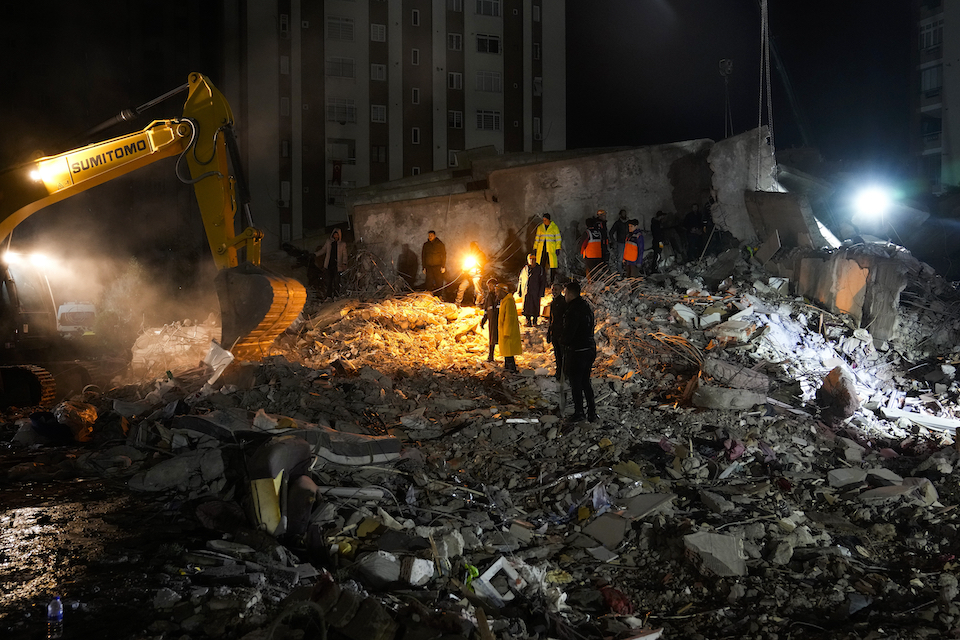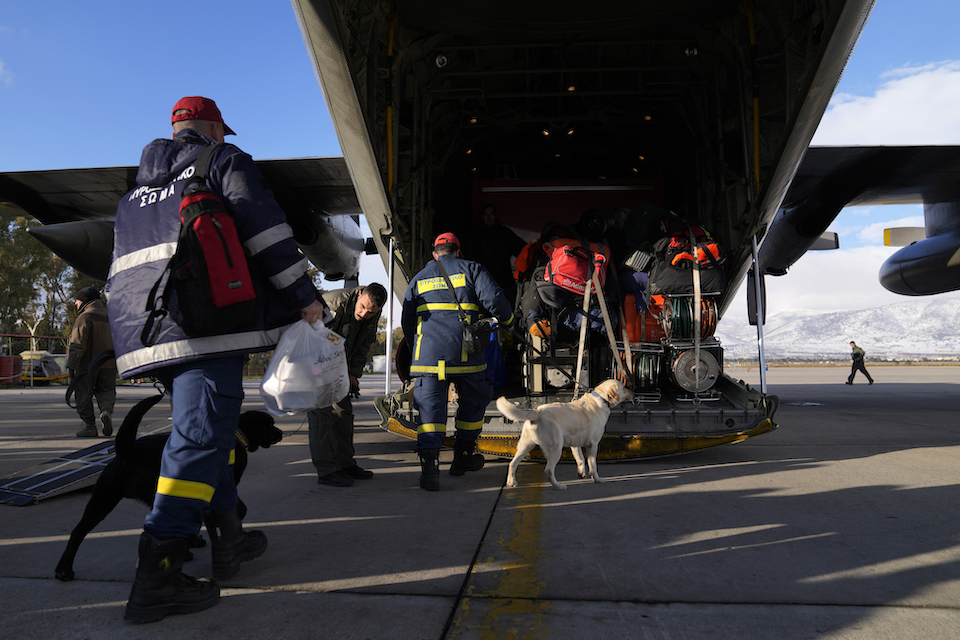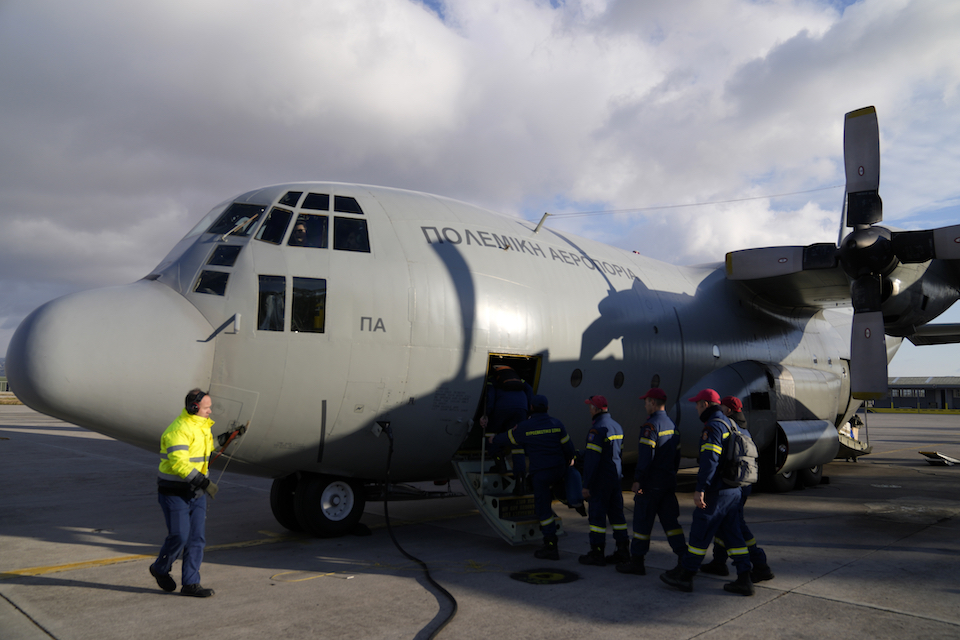
Turkey and Syria are still healing their wounds from a massive, deadly 7.8 magnitude earthquake that killed thousands and wreaked havoc and destruction in both countries.
At night, rescue teams feverishly work against the clock, trying to find and extract survivors from the rubble of thousands of destroyed buildings.
At least 2,316 people have died in Turkey. 13 293 were injured in 10 provinces of the country due to the first, strong earthquake, which was felt before Egypt and Israel, and another, with a magnitude of 7.5 on the Richter scale, which hit the same area later.
The same missile attack killed at least 1,293 people in Syria, according to the country’s health ministry.
Dangerous aftershocks, bad weather
Tremors, snowfall and rain, combined with nighttime temperatures, are hampering the work of rescue teams and homeless people in both countries.
Thousands already saved
Orhan Tatar, director general of the risk reduction department of the President’s Disaster and Emergency Management Agency (AFAD), announced that a total of 5,606 buildings collapsed in Turkey and 7,340 people were rescued from the rubble.
About 9,700 people are involved in search and rescue operations, according to AFAD. There is currently no tsunami danger on the eastern coast of the Mediterranean Sea.

Tatar added that the Turkish oil pipeline company BOTAS decided “for purely precautionary reasons” to stop the flow of oil to the region.
Erdogan: the biggest disaster since 1939
Turkish President Recep Tayyip Erdogan said that this is the biggest disaster in the country since the earthquake measuring 7.8 on the Richter scale in 1939, which occurred near the city of Erzincan. In that earthquake of the last century, more than 32,700 people died, a half-meter tsunami was caused.
“Our state has taken action with all its institutions after the earthquake,” he said from the AFAD office in Ankara, referring to full mobilization. Erdogan spoke on the phone with the mayors of Adana, Osmaniye, Hatay and Kilis and was briefed on the search and rescue efforts.
An ancient castle in Gaziantep, Turkey, was badly damaged by a magnitude 7.8 earthquake on Monday, raising concerns about damage to other important antiquities in a region that has been a cultural crossroads for millennia. https://t.co/14JyfSEBKd pic.twitter.com/AMF2qXvIa0
— New York Times (@nytimes) February 6, 2023
Syria: more than 3,400 wounded
In Syria, 593 dead and another 1,411 injured have been removed from government-controlled areas in the provinces of Aleppo, Latakia, Hama and Tartus, the Syrian health ministry said.
At least 700 people have died and more than 2,000 have been injured in rebel-held northwestern areas, according to a White Helmets rescue team.
There are millions of refugees on the Turkish-Syrian border who fled the Syrian civil war and live in temporary shelters.

The earthquake that struck Turkey on Monday was one of the strongest ever recorded in the country, even shaking buildings in Israel and Syria. More than 500 deaths have been reported, but the toll is expected to rise.
See photos of some of the aftermath. https://t.co/pj19nswV0n pic.twitter.com/o7VXX22jqE
— New York Times (@nytimes) February 6, 2023
International assistance
Countries from all over the world are sending aid to the two countries affected by the earthquake. The European Union, NATO, the United States have pledged to help the affected areas, as have the United Kingdom, Russia, Japan, the Gulf states and Iran, among others.
Greece is sending a team of 21 rescuers, two rescue dogs and a special vehicle, as well as a civil engineer, five doctors and seismic design experts. The group travels in a military transport aircraft.


Communication between Mitsotakis and Erdogan
Prime Minister Kyriakos Mitsotakis had a telephone connection with his president Recep Tayyip Erdogan, Turkey.
The Prime Minister expressed his regret over the devastating earthquake in Turkey and conveyed to Tayyip Erdogan the support and condolences of the government and the Greek people for the loss of life.
He reaffirmed Greece’s readiness to provide comprehensive assistance to Turkey in eliminating the consequences of the devastating earthquake.
The Turkish President thanked the Prime Minister for his support and immediate help.
Adana. Rescuers here are calling for silence, hoping to hear someone stuck under the rubble. pic.twitter.com/Y9398K8oFz
— Piotr Zalewski (@p_zalewski) February 6, 2023
Sakellaropoulou: Greece stands in solidarity with the struggling Turkish people
President of the Republic Katerina Sakellaropoulou also contacted Turkish President Recep Tayyip Erdogan and expressed condolences to the victims of the devastating earthquake.
Contacts Dendia – Tsavusoglu
Foreign Minister Nikos Dendias previously contacted Turkish counterpart Mevlut Cavusoglu to convey his condolences and the country’s willingness to support Turkey.

Reviews
“My sister and her three children are under the rubble. So did her husband, father-in-law and mother-in-law. Seven members of our family,” Mukhitin Oraksi said in the morning in front of the ruins of a building in Diyarbakir, southeast Turkey.
Melissa Salman, a 23-year-old journalist from Kahramanmaras, says she is accustomed to living with earthquakes: “But this is the first time I’ve experienced something like this. We thought the Apocalypse had arrived,” he said.
Bad weather in this mountainous region has paralyzed the main airports around Diyarbakir and Malatya, where heavy snowfalls continue. Those who escaped the earthquake, but were left homeless, found themselves in pajamas on the street in the cold.
“We hear voices here and there below. We think about 200 people were trapped under the rubble,” the rescuer said, referring to the collapsed building in Diyarbakır.
Faced with this disaster, residents everywhere are mobilizing and trying to remove the rubble by hand or with shovels.
In Hama, in central-western Syria, rescuers and civilians manually pulled bodies out of a building. Among them was a child. In Kdararis, further north, a depressed man mourns the death of his son, a little boy who holds him in his arms, refusing to part with him. In this village on the border with Turkey, at least 40 houses collapsed like paper towers.
The residents have no technology and are digging with household tools and with their own hands to find survivors. “My whole family is buried here. My sons, my daughter, my son-in-law, there is no one to take them out,” says Ali Batal, choking with effort.
“Judgment Day”
In Aleppo, 37-year-old Anas Khabake, as soon as he felt the earthquake, went after his son and shouted to his pregnant wife to go down to the entrance of their three-story residential building.
“We went down the stairs like crazy, and as soon as we got outside, we saw dozens of terrified families. Some were on their knees and praying, others were crying as if the Day of Judgment had come,” he said.
“I have not felt anything like this in all the years of the war. The situation is much worse than the bombs.”
Source Anadolu, France 24, APE-MPE
Source: Kathimerini
Anna White is a journalist at 247 News Reel, where she writes on world news and current events. She is known for her insightful analysis and compelling storytelling. Anna’s articles have been widely read and shared, earning her a reputation as a talented and respected journalist. She delivers in-depth and accurate understanding of the world’s most pressing issues.